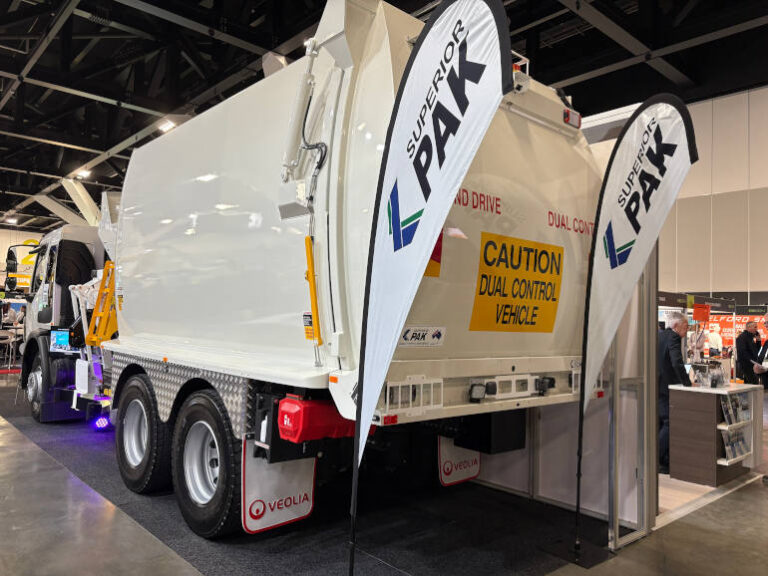At this year’s ReGen 2025 show in Sydney Superior Pak teamed up with Volvo to unveil its latest Raptor Series 6 side loader compactor, fitted to a Volvo FE Euro 6 chassis. The highlight of the display was a fully integrated system featuring the most advanced technology the Australian manufacturer has ever offered.
Anthony Uroda, Sales Manager NSW/ACT at Superior Pak, said the Raptor Series 6 delivers major improvements in automation and efficiency, especially for high-demand municipal waste operations. “For us, it’s probably the latest tech that’s gone into it,” he explained. “Self-calibrating is probably the biggest step forward that we’ve made.”
Uroda noted that side loaders are incredibly hard-working and technically complex. “The pressures they need to operate at, the cushioning required for emptying bins, and the speed and performance needed to complete hundreds of lifts each day—all of it adds up,” he said.
The new Raptor system comes factory-programmed to a standard specification, but what sets it apart is its self-calibrating capability in the field. “If you’re changing an encoder, or there’s been damage, or you just want to ensure the machine is back in spec, the system will do it automatically,” said Uroda. “Workshops just put it into maintenance mode, cordon off the area, and the system will run its own performance checks and recalibrate itself.”
Addressing the skills shortage
Superior Pak sees this innovation as a way to reduce the industry’s reliance on manual labour and hard-to-source technical skills. “Labour’s been a problem—staff shortages, an ageing workforce. How many people really want to get under a dirty garbage truck and swing spanners anymore?” said Uroda.
“With fewer experienced mechanics coming through, this takes the guesswork and prior knowledge out of it. The machine does it all for you.”
Built for the rigours of daily collection
With most side loaders expected to complete 1,200 to 1,800 lifts per day—often across two or three full loads—durability and precision matter. “They’re by far the hardest working bit of equipment on the road,” said Uroda. “Stop-start driving, harsh braking and acceleration, tight turns, bins in awkward places—it’s a tough job, and our equipment has to be just as tough.”
Designing a compactor body that matches the technical complexity of modern Euro 6 chassis was another key focus. “With emissions systems and other components taking up more real estate on the chassis, our engineers redesigned the body to optimise weight distribution, maximise payload and preserve manoeuvrability,” he said.
The new Series 6 body, Uroda explained, is “suitable for the chassis of now and into the future.”
Supporting fleet managers through transition
Uroda acknowledged that fleet managers upgrading to Euro 6 chassis will face a learning curve. “It is changing for them too. There’s obviously a price point consideration, but we’re focused on keeping R&M costs down and making maintenance easier,” he said. “I don’t think we’ll get the unit to do anything quicker than it is now—we’re at the optimal speed where safety is still the number one priority.”
Leading in low-emission collection vehicles
Superior Pak is also actively developing zero-emission alternatives, having already delivered both hydrogen fuel cell and full battery electric side and rear loaders in the past. “Our pedigree was always to be the first,” said Uroda. “We were the first to have a fully hydrogen fuel cell side loader produced with Hyzon—and that’s still working every day. We were the first with a full electric battery-powered side loader and rear loader.”
He added that the company is working closely with all major OEMs to understand what the future looks like for electric and hydrogen refuse collection vehicles. “The challenge is Australia itself,” he said. “The urban sprawl, the distances to cover—it’s a challenge for any OEM building a chassis.”
Proudly Australian
Despite the challenges, Uroda remains confident in the strength and future of Australia’s waste manufacturing industry. “The one thing about waste is everyone’s passionate,” he said. “I find the waste industry incestuous and infectious—once you’re in, you’re in for life.”
He closed with a strong note of optimism: “The future is good for what we produce in Australia as manufacturers. We can take on anyone in the world.”






